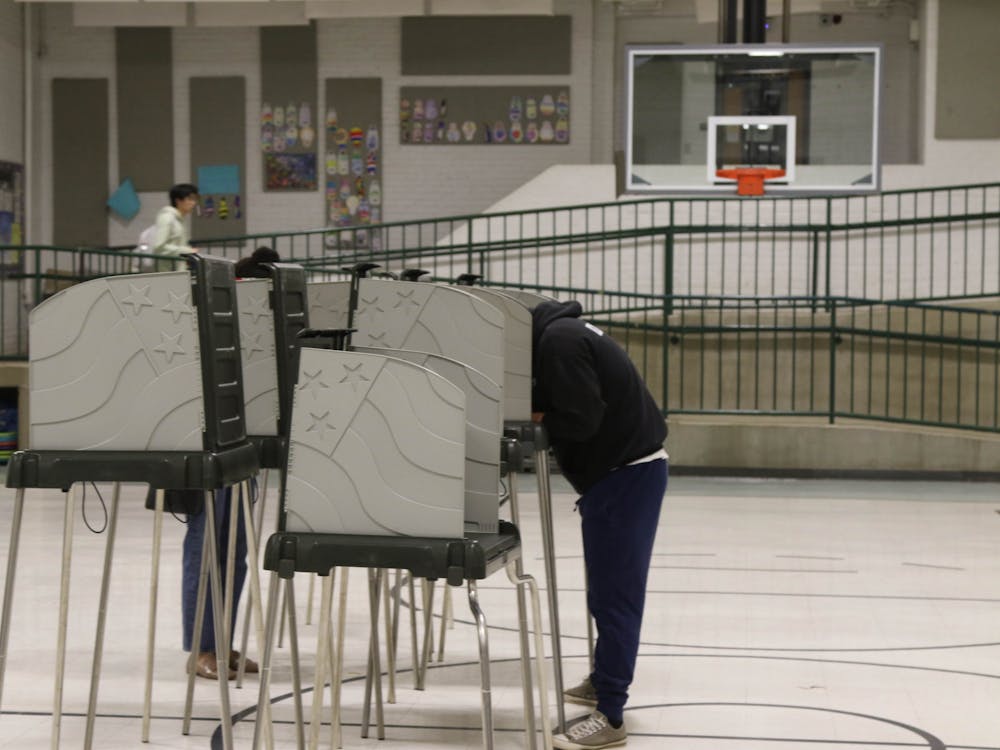After a ruthless campaign season, Election Day has come and gone. Some races, including key North Carolina elections, have already been called, while others are still too close to call.
Duke faculty met at the Sanford School of Public Policy on Wednesday to discuss these results and their implications. The 2024 presidential election, abortion access, voter disenfranchisement, the role of the media and the state of American democracy itself were all topics of discussion for panelists Adriane Lentz-Smith, associate professor of history, Kerry Haynie, professor of political science and dean of the social sciences, Asher Hildebrand, associate professor of the practice at Sanford, and Mac McCorkle, Sanford associate professor of the practice.
Panelists discussed the biggest surprises and takeaways from elections in North Carolina and across the country.
“Nobody expected Democrats to have even a chance at maintaining their House majority in Congress,” Hildebrand said. “In the last weeks of the campaign, many had confidently predicted that Republicans would march to a Senate majority as well.”
Hildebrand, the former chief of staff to Rep. David Price, a Democrat, emphasized the Democratic strides in nationwide Senate races. He also discussed historic governorships in Maryland and Massachusetts, as well as three state legislative chambers that have obtained a Democratic majority for the first time in many years.
Though Republicans overperformed in states like Georgia, North Carolina and Florida, there have been few surprises breaking in the direction of Republicans. There have been many, however, in the direction of Democrats, Hildebrand said.
This is in part due to inaccurate polling, as well as media narratives intended to mobilize Republican voters, according to Hildebrand.
On pressing issues, including abortion, Hayden added that “voters are responding to extremism in the sense of democracy being at threat — rights and freedoms being at risk that we thought were won and not to be worried about again … and I think that will carry over to 2024.”
The 2024 presidential election was at the forefront of panelists’ discussion. Faculty offered insight into how the midterms could forecast future races. In particular, questions about the GOP primary race with candidates former President Donald Trump and Florida Gov. Ron DeSantis were posed by the audience.
The panel reached a consensus that a potential Republican primary challenge between Trump and DeSantis could sway the direction of the GOP, creating change and a space for a "conservative, but pro-democratic force" to emerge. That would be a "best-case scenario" for Democrats, according to Hildebrand.
Panelists said an encouraging sign was the fact that candidates that endorsed election denialism were largely unsuccessful across the country — particularly Trump-backed candidates like Republican Senate hopeful Mehmet Oz in Pennsylvania and Bo Hines, who ran for U.S. House in North Carolina’s 13th Congressional District.
Despite the lack of a dual-chamber Republican supermajority, McCorkle said that abortion rights in North Carolina are still up in the air. Every single Democratic congressperson would have to back Gov. Roy Cooper’s veto and they would find no sympathy in a newly Republican-controlled judiciary, he said.
On a national level, Lentz-Smith argued that abortion is not simply a partisan issue, citing that “Republican women get abortions too.”
Haynie emphasized that abortion seemed to be a mobilizing issue for Democrats, with women turning out at polling sites and tending to vote Democratic. However, he reminded the audience that while Cheri Beasley won the female vote by 7% in the U.S. Senate race for North Carolina, Ted Budd actually won the vote among white women.
He also said that the gender gap seen in election results is bolstered by Black women voting blue in vast majorities, highlighting the importance of investigating the intersection of race and other factors in elections.
Lentz-Smith said that while outright election denialism proved unpopular this election, voter disenfranchisement remains an issue, drawing comparisons between the 1890s and today.
“I think that [high voter turnout among young people] bespeaks concern. I think these people were [presented] … one vision of a multiracial American democracy, and they see this upsurge of racial nationalism and they worry about it.”
McCorkle added that voter enfranchisement, particularly as it relates to a more favorable outcome for Democrats than expected, is not just about getting people to the polls. It’s also supporting a “new generation of Democratic leadership” in state and local elections that are seen as lost causes for Democrats, he said.
Combined with the Dobbs decision making people question “narratives of progress," Lentz-Smith finished, “We are reminded in a way that I hope folks internalize, but I worry that they won’t, that democracy isn’t just something that happens … Our democracy is actually very, very new."
Get The Chronicle straight to your inbox
Signup for our weekly newsletter. Cancel at any time.

Sasha Richie is a Trinity senior and a sports managing editor of The Chronicle's 118th volume.

